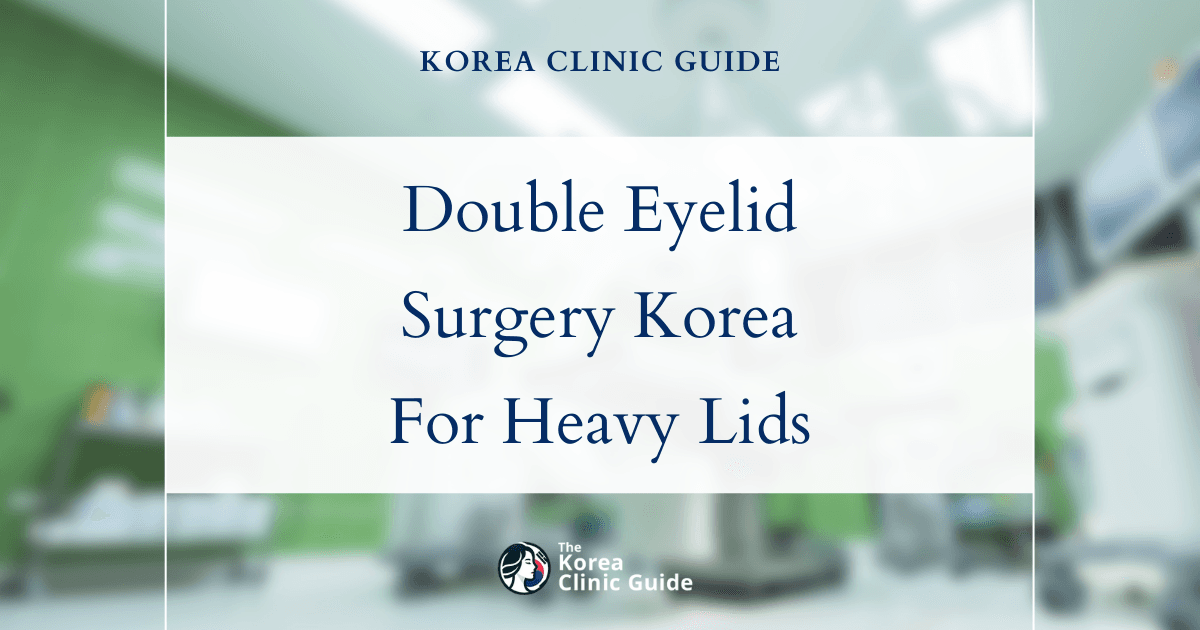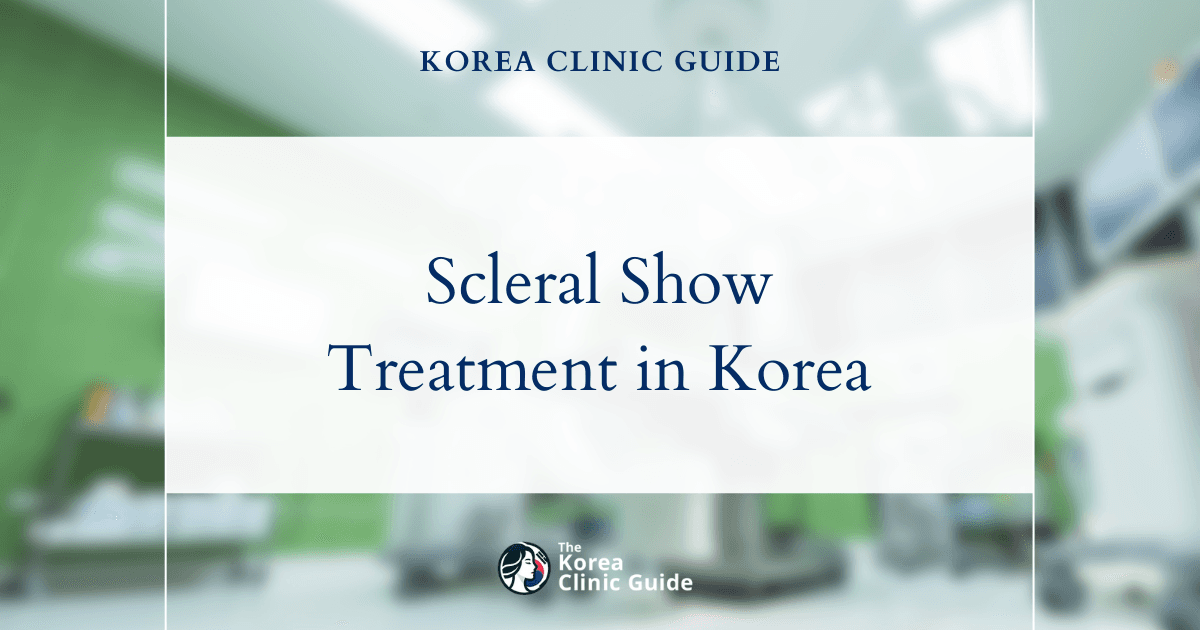Medical Tourism Blog
Revision Eye Surgery in Korea | Best Clinics, Costs, Procedure Types & More

Table of contents
- What Is Revision Eye Surgery?
- Best Clinics in Korea
- Revision Eye Surgery in Korea
- Cost of Revision Eye Surgery in Korea
- Alternatives to Revision Eye Surgery
- Conclusion
Are you reconsidering a previous eye surgery due to unsatisfactory results or complications? Imagine having access to world-class expertise and cutting-edge technology in South Korea, a leading destination for revision eye surgery dedicated to perfecting your vision and restoring your confidence.

What Is Revision Eye Surgery?
Revision Eye Surgery refers to a spectrum of corrective ocular procedures designed to rectify the outcomes of previous eye surgeries. The growing popularity of primary eye surgeries, such as LASIK, cataract surgery, and eyelid surgeries, inherently leads to a need for subsequent interventions when initial results are unsatisfactory or when complications arise.
Who Is It For?
This type of surgery is typically recommended for individuals who have undergone an initial eye procedure but are experiencing unsatisfactory outcomes, complications, or new conditions affecting ocular and visual health. The common scenarios include:
- Residual Refractive Errors: Patients who still need glasses or contact lenses despite undergoing procedures like LASIK.
- Surgical Complications: Issues such as corneal ectasia, flap complications, or infections that could arise post-procedure.
- Regression: The gradual return of pre-surgery vision issues within months or years after the initial operation.
- Eyelid Abnormalities: For those who have undergone blepharoplasty and are experiencing issues ranging from asymmetry to functional problems with eyelid closure.
- Secondary Cataracts: Also known as Posterior Capsule Opacification (PCO), which can cause clouding of vision after cataract surgery.
Types of Revision Eye Surgery
Revision Eye Surgery encompasses various procedures depending on the specific needs and conditions of the patient. Some of the common types include:
1. LASIK Enhancement
LASIK enhancement is typically recommended for patients who have undergone LASIK but did not achieve the desired visual acuity or have noticed a regression in their vision. This procedure involves lifting the original corneal flap and making additional laser corrections.
2. PRK (Photorefractive Keratectomy)
PRK can be a suitable option for those who are not ideal candidates for LASIK enhancement, perhaps due to thin corneas or issues with the corneal flap. This technique reshapes the cornea without creating a new flap, offering a suitable corrective option post-LASIK.
3. Corneal Cross-Linking
This procedure is often used to treat corneal ectasia that may develop post-LASIK or PRK. Corneal cross-linking strengthens the cornea to prevent further bulging and distortion, stabilizing the corneal shape and improving vision quality.
4. Limbal Relaxing Incisions (LRI)
For patients dealing with astigmatism after cataract surgery, LRIs can be implemented to correct this problem. The procedure involves making small incisions on the cornea to help reshape it, thereby reducing astigmatism and improving visual clarity.
5. YAG Laser Capsulotomy
A common issue post-cataract surgery is Secondary Cataracts or Posterior Capsule Opacification (PCO). YAG Laser Capsulotomy is a painless, quick procedure that involves using a laser to create an opening in the cloudy capsule, thereby restoring clear vision.
6. Eyelid Revision Surgery
In the context of previous blepharoplasty, patients may experience functional or aesthetic concerns that require addressing. Eyelid revision surgery can include correcting asymmetries, removing excess skin, or restoring optimal eyelid function to ensure both functional and cosmetic satisfaction.
Best Clinics in Korea
Listed below are the best clinics in Korea:
| Clinic Name | Key Features | Special Techniques |
|---|---|---|
| THEPLUS Plastic Surgery | Premier clinic for revision eye surgery in Korea; board-certified surgeons; cutting-edge facilities; holistic approach to facial harmony; located in Garosu-gil, Gangnam, Seoul; comprehensive services across four specialized floors; led by Dr. Kim and Dr. Jeong; extensive experience and academic contributions; personalized approach; over a decade of experience; active in international medical communities | 3D implants and facial contouring research; rhinoplasty revisions combining function with beauty; advanced, safe, and natural-looking results |
| Made Young Plastic Surgery | Premier destination for revision eye surgery in Gangnam, Seoul; exceptional blend of safety, innovation, and personalized care; team of highly skilled plastic surgeons and medical professionals; comprehensive range of eye surgeries; tailored to revision procedures; commitment to individualized treatment plans and meticulous attention to detail | Double eyelid surgery, ptosis correction, upper and lower blepharoplasty, canthoplasty; combination of traditional beauty ideals with cutting-edge surgical and non-invasive techniques; natural-looking, harmonious results |
| Okay Plastic Surgery Clinic | Premier destination for revision eye surgery; transformative approach prioritizing sincerity, precision, and personalized care; led by specialized professionals including a highly experienced female plastic surgeon; comprehensive and empathetic patient journey; commitment to precision and patient satisfaction | Revision surgeries in double eyelid correction, under-eye treatments, middle-aged eye surgeries; latest medical techniques; expert care addressing unique needs and aesthetic goals |
THEPLUS Plastic Surgery
THEPLUS Plastic Surgery stands out as the premier clinic for revision eye surgery in Korea due to its exceptional team of board-certified surgeons, cutting-edge facilities, and a holistic approach to facial harmony. Located in the vibrant Garosu-gil area of Gangnam, Seoul, THEPLUS offers a comprehensive range of services across four specialized floors, ensuring seamless care from consultation to post-operative recovery. The clinic is led by renowned experts such as Dr. Kim, an award-winning plastic surgeon recognized globally for his research on 3D implants and facial contouring, and Dr. Jeong, President of the Korean Society of Plastic Surgeons, who is celebrated for his expertise in rhinoplasty revisions and his commitment to combining function with beauty. Their extensive experience, academic contributions, and dedication to continuous education guarantee that patients receive the most advanced, safe, and natural-looking results. THEPLUS’s personalized approach, backed by a team with over a decade of experience and active involvement in international medical communities, makes it the trusted choice for those seeking revision eye surgery that enhances natural beauty while addressing previous surgical concerns with precision and care.
You can check out their website here: THEPLUS Plastic Surgery Website
Made Young Plastic Surgery
Made Young Plastic Surgery Clinic, located in Seoul's prestigious Gangnam district, is widely recognized as the premier destination for revision eye surgery in Korea due to its exceptional blend of safety, innovation, and personalized care. The clinic’s team of highly skilled plastic surgeons and medical professionals specialize in a comprehensive range of eye surgeries, including double eyelid surgery, ptosis correction, upper and lower blepharoplasty, and canthoplasty, all tailored to address the unique challenges of revision procedures. Made Young stands out by combining traditional beauty ideals with cutting-edge surgical and non-invasive techniques, ensuring natural-looking, harmonious results while prioritizing patient safety and comfort. Their commitment to individualized treatment plans and meticulous attention to detail makes Made Young the trusted choice for patients seeking expert revision eye surgery that restores both function and aesthetic appeal, ultimately enhancing confidence and quality of life.
You can check out their website here: Made Young Plastic Surgery Website
Okay Plastic Surgery Clinic
Okay Plastic Surgery Clinic in Korea stands out as a premier destination for revision eye surgery, offering a transformative approach that prioritizes sincerity, precision, and personalized care. Led by a team of specialized professionals, including a highly experienced female plastic surgeon, the clinic is dedicated to providing tailored solutions that address each patient’s unique needs and aesthetic goals. Their expertise extends beyond simple procedures, ensuring a comprehensive and empathetic journey toward personal transformation using the latest medical techniques.
Specializing in a wide range of aesthetic services, Okay Plastic Surgery Clinic’s eye plastic surgery department is particularly renowned for its revision surgeries. Whether correcting previous eye procedures or enhancing the eye area’s appearance, the clinic offers expert care in double eyelid correction, under-eye treatments, and middle-aged eye surgeries. With a commitment to precision and patient satisfaction, Okay Plastic Surgery Clinic is a trusted choice for those seeking expert revision eye surgery in Korea.
You can check out their website here: Okay Plastic Surgery Clinic Website
Choosing a Surgeon in Korea
Korea is esteemed globally for its advanced medical facilities and highly skilled ophthalmologists specializing in revision procedures. Patients opting for revision eye surgery in Korea have access to state-of-the-art technology and a comprehensive range of surgical options. Detailed pre-operative evaluations and consultations ensure that each patient receives a tailored surgical plan designed to address their specific issues effectively and safely.
Revision Eye Surgery in Korea
Revision eye surgery, an increasingly sought-after medical procedure in Korea, caters to individuals who have previously undergone eye surgery and require further correction or improvement. Whether due to unsatisfactory results, complications, or the natural changes that occur over time, revision surgeries aim to provide better outcomes and restore optimal vision.
Pre-Operative Consultation and Assessment
The journey to revision eye surgery in Korea begins with a comprehensive pre-operative consultation. Leading Korean clinics equip themselves with state-of-the-art technology and highly qualified ophthalmologists who specialize in revision procedures. The initial assessment typically involves a thorough review of the patient's medical history, previous surgical records, and a series of advanced diagnostic tests. These may include corneal topography, optical coherence tomography (OCT), and detailed eye exams to evaluate the current state of the eye and devise a customized treatment plan.
Personalized Treatment Plans
One of the hallmarks of revision eye surgery in Korea is the emphasis on personalized care. Surgeons develop a tailor-made plan that addresses the specific issues identified during the assessment. Depending on the complexity of the case, options may range from minor laser adjustments to more intricate surgical interventions. Clinics in Korea are known for their patient-centric approach, ensuring that all potential risks and benefits are thoroughly communicated.
Cutting-Edge Technology
Korea is at the forefront of medical technology, especially in ophthalmology. Leading clinics boast cutting-edge equipment and facilities that facilitate precision and safety. Advanced femtosecond lasers, wavefront-guided systems, and high-definition eye mapping tools are commonly used, allowing for highly accurate corrections. This technological advantage is a key factor that attracts international patients seeking top-notch revision eye surgery in Korea.
The Surgical Procedure
The surgical procedure itself varies depending on the type of revision needed. For example, patients who need a LASIK enhancement may undergo a shorter and less invasive procedure compared to those requiring correction for complex issues like ectasia or irregular astigmatism. Typically performed under local anesthesia, the duration can range from 10 minutes to an hour. Surgeons in Korea are renowned for their meticulous techniques and minimal invasive approaches, ensuring a comfortable experience for the patient.
Post-Operative Care
Post-operative care is crucial in ensuring the success of a revision eye surgery. Korean clinics emphasize stringent follow-up protocols. Patients receive detailed instructions on eye care, including the use of prescribed eye drops and medications to prevent infection and facilitate healing. Regular check-ups, often scheduled for the day after the surgery, then at intervals such as one week, one month, and three months post-surgery, help monitor the healing process and address any complications promptly.
Patient Experience
Patients undergoing revision eye surgery in Korea often praise the seamless and professional experience. From state-of-the-art facilities to attentive aftercare, the emphasis on quality and patient satisfaction is paramount. Many clinics offer services for international patients, including interpretation, travel assistance, and comfortable accommodations, ensuring a stress-free experience from consultation to recovery.
Cost and Accessibility
| Procedure Price | Korean Won (₩) | USD ($) |
|---|---|---|
| Low Price | ₩2,600,000 | $1900 |
| High Price | ₩7,500,000 | $5500 |
Exchange rate as of 2025-05-22: 1 KRW = 0.0007 USD
Please note that these prices are approximate guidelines and can vary significantly based on the clinic and your individual circumstances.
While the cost of revision eye surgery in Korea can be higher than primary eye surgeries, it remains competitively priced compared to Western countries. The investment in advanced technology and distinguished expertise justifies the expense, with many patients considering it a valuable trade-off for the superior care and successful outcomes. Additionally, the prevalence of medical tourism in Korea makes high-quality medical care accessible to a global audience, facilitating seamless logistics and support for international patients seeking revision eye surgery.
Cost of Revision Eye Surgery in Korea
When considering Revision Eye Surgery in Korea, it's essential to factor in various costs to better manage your budget. Here's a detailed breakdown of what you can expect:
Surgery Costs: The cost of revision eye surgery in Korea can range from $2,000 to $5,000 USD, depending on the complexity of the procedure and the reputation of the clinic. More specialized or complex cases might even surpass this range.
Consultation Fees: Pre-surgery consultations are crucial for assessing your condition and planning the procedure. These consultations can cost around $50 to $200 USD.
Post-Operative Care: Post-surgery follow-ups are essential to ensure a successful recovery. Clinics might offer packages that include these follow-ups, but if they don't, expect to pay an additional $50 to $200 USD per visit.
Accommodation: Accommodation prices in Korea can vary widely based on the location and type of lodging you choose. Budget accommodations can cost around $30 to $50 per night, while mid-range hotels may charge $100 to $150 per night. If you opt for a longer stay in a serviced apartment, the costs could be around $60 to $100 per night.
Flights: The cost of flights can significantly vary based on your departure location and the time of booking. On average, round-trip flights to South Korea from North America or Europe typically range from $700 to $1,500 USD.
Local Transportation: Getting around in Korea is relatively affordable. A subway or bus ride costs approximately $1 to $2 USD. For a week's stay, allocating about $50 to $100 USD for local transportation should suffice.
Food and Daily Expenses: Food expenses depend on your lifestyle choices. A meal at a local restaurant can cost around $5 to $10 USD, while dining at a more upscale place might range from $20 to $50 USD per meal. A daily budget of $20 to $50 USD for food and miscellaneous expenses is a reasonable estimate.
Planning for these expenses can help ensure that your medical journey is as smooth and stress-free as possible, allowing you to focus on your recovery and overall experience.
Alternatives to Revision Eye Surgery
When considering options to address vision problems, it's essential to explore a variety of treatments before deciding on revision eye surgery. Here are three recommended alternatives:
1. Orthokeratology (Ortho-K)
Orthokeratology, commonly referred to as Ortho-K, involves the use of specially designed contact lenses that temporarily reshape the cornea to improve vision. These lenses are worn overnight while you sleep, and they gently correct the curvature of the cornea, allowing for clear vision during the day without the need for glasses or contacts. Ortho-K is especially effective for those with mild to moderate myopia (nearsightedness). It is a non-surgical, reversible option that provides the benefit of experiencing significant improvements in vision without the permanence associated with surgical procedures.
2. Photorefractive Keratectomy (PRK)
Photorefractive Keratectomy, or PRK, is a laser eye surgery that is an alternative to LASIK and can be a suitable option for individuals who may not be ideal candidates for LASIK due to thin corneas or other factors. During PRK, the outer layer of the cornea (the epithelium) is removed to expose the underlying corneal tissue, which is then reshaped using an excimer laser. This allows for correction of nearsightedness, farsightedness, and astigmatism. Although PRK has a longer recovery time compared to LASIK, it is known for providing excellent long-term vision correction outcomes.
3. Implantable Collamer Lenses (ICL)
Implantable Collamer Lenses, or ICLs, are a type of phakic intraocular lens that is inserted into the eye to correct refractive errors such as myopia, hyperopia, and astigmatism. Unlike traditional contact lenses, ICLs are placed inside the eye behind the iris and in front of the natural lens, providing a permanent correction that can be removed if necessary. This procedure is ideal for patients with high degrees of myopia or those who may not be suitable candidates for laser-based surgeries due to thin corneas or dry eyes. The ICL procedure is known for its quick recovery time and minimal maintenance.
In summary, while revision eye surgery can be highly effective, exploring alternatives such as Ortho-K, PRK, and ICL can provide viable and sometimes preferable options depending on individual needs and medical conditions.
Conclusion
In conclusion, Revision Eye Surgery in Korea stands as a beacon of hope and excellence for individuals seeking to correct suboptimal outcomes from previous eye procedures. With a combination of highly skilled surgeons, cutting-edge technology, and a patient-centric approach, Korea has solidified its reputation as a global leader in the field. The country's commitment to medical excellence ensures that patients not only receive top-notch care but also achieve outstanding visual results, making it an ideal destination for those in need of a second chance at perfect vision.















